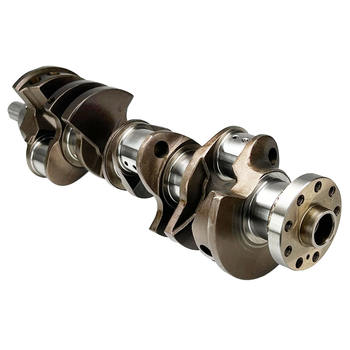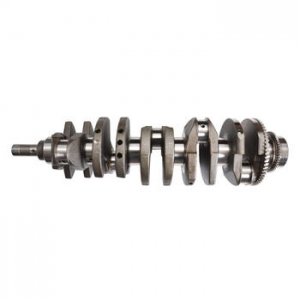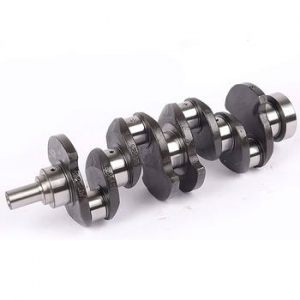When you're building or repairing high-performance engines, durability, strength, and reliability are paramount. Every component must withstand incredible stress, and few parts face as much brutal force as the crankshaft. This is the heart of the engine, converting the linear motion of the pistons into rotational energy that ultimately drives the vehicle or machinery. Given its critical role, the material and manufacturing method are non-negotiable. Forged steel crankshafts are widely recognized as the superior choice compared to cast iron or other alternatives due to their inherent toughness and grain structure, which provides exceptional resistance to fatigue and fracture under extreme loads. But producing a truly high-quality forged steel crankshaft is a complex process demanding specialized knowledge, advanced technology, and stringent quality control. This brings us to a vital question for anyone involved in engine manufacturing, repair, or tuning: how do you find the best forged steel crankshaft suppliers? It's not just about finding someone who can make the part; it's about partnering with a supplier who understands the nuances of performance applications and can consistently deliver components that meet the highest standards. Frankly speaking, making the wrong choice here can lead to catastrophic engine failure down the line, negating all other efforts and investments. The selection process requires careful consideration of several key factors, looking beyond just the price tag to assess true value and long-term reliability. Understanding the supplier's capabilities, their manufacturing processes, their commitment to quality, and their experience in your specific industry niche is absolutely essential. This article aims to provide a comprehensive guide to help you navigate this critical decision-making process, offering insights into what separates the good suppliers from the truly exceptional ones in the competitive landscape of forged steel crankshaft manufacturing. Have you ever wondered about the hidden factors that differentiate crankshaft quality among seemingly similar suppliers?
The Undeniable Advantages of Forged Steel Crankshafts
Let's delve a bit deeper into why forged steel is the material of choice for demanding engine applications and why seeking specialized forged steel crankshaft suppliers is so crucial. Forging is a manufacturing process where metal is shaped by compressive forces using a hammer, press, or roll. Unlike casting, which involves pouring molten metal into a mold, forging aligns the grain structure of the metal, making the resulting part significantly stronger and more resistant to impact and fatigue. Think of it like wood grain; a forged part has a continuous grain flow that follows the contours of the crankshaft, whereas a cast part's grain structure is more random and prone to internal voids or inconsistencies. This directed grain flow in forged steel provides superior tensile strength, yield strength, and impact toughness. For crankshafts, which undergo millions of cycles of alternating tensile and compressive stresses, this inherent strength is a game-changer. High-performance engines, racing applications, heavy-duty trucks, and industrial machinery all rely on the robustness that only forged steel can provide. A crankshaft failure in such applications isn't just inconvenient; it can cause extensive damage to the entire engine and even pose safety risks. Therefore, sourcing these critical components from experienced forged steel crankshaft suppliers isn't merely a preference; it's a technical necessity. These suppliers possess the specialized forging equipment, precise dies, and metallurgical expertise required to shape high-quality steel alloys into complex crankshaft geometries while maintaining the integrity of the grain structure. Interestingly enough, the specific alloy of steel used and the subsequent heat treatment processes are just as important as the forging itself, further highlighting the need for a supplier with deep technical knowledge. Choosing forged steel is a commitment to performance and longevity, and finding the right supplier is the first step in honoring that commitment. It's worth noting that while cast crankshafts might be sufficient for some standard production vehicles, they simply cannot handle the higher RPMs, increased cylinder pressures, and extended duty cycles common in performance or heavy-duty scenarios.
Identifying Key Criteria for Reliable Forged Steel Crankshaft Suppliers
Selecting the right partner among various forged steel crankshaft suppliers involves more than just reviewing product catalogs. You need to look under the hood, so to speak, and evaluate their operational capabilities and quality assurance processes. A truly reliable supplier will demonstrate a profound understanding of metallurgy, forging techniques, machining precision, and quality control. Their manufacturing facility should utilize state-of-the-art forging presses capable of applying immense, controlled forces to shape the steel accurately. Precision machining is equally vital, as the crankshaft's journals, counterweights, and flanges must meet extremely tight tolerances to ensure smooth operation, proper bearing fit, and engine balance. A supplier's investment in advanced CNC machining centers and grinding equipment is a strong indicator of their commitment to precision. Furthermore, their quality control procedures should be rigorous, encompassing non-destructive testing methods like magnetic particle inspection or ultrasonic testing to detect any internal flaws or surface cracks that could compromise the crankshaft's strength. Experienced forged steel crankshaft suppliers often hold relevant certifications such as ISO 9001 or IATF 16949, which signify adherence to internationally recognized quality management standards, particularly important in the automotive industry. Don't hesitate to ask about their quality assurance documentation, their defect rates, and their process for handling non-conforming products. A transparent supplier will welcome such inquiries and be able to provide detailed information about their quality protocols. Evaluating a supplier's track record and reputation within the industry is also crucial. Have they supplied crankshafts for similar applications or to reputable engine builders? What is their history of on-time delivery and customer satisfaction? These are critical questions to ponder during your assessment phase.
Understanding the Manufacturing Process and Material Quality
To make an informed decision when evaluating forged steel crankshaft suppliers, gaining some insight into their specific manufacturing process is invaluable. While the core principle of forging (shaping metal with force) is universal, the details matter immensely. Suppliers may use different forging methods, such as open-die forging, closed-die forging, or even complex flow-forming processes for certain designs. Closed-die forging, often used for crankshafts, involves placing a heated billet between two dies that contain the desired shape. When the press applies force, the metal fills the die cavities, creating the rough shape of the crankshaft. This method is excellent for achieving consistent shapes and promoting the desired grain flow. After forging, the crankshaft undergoes various post-forging processes, including cooling, cleaning, and then heat treatment. Heat treatment is a critical step that optimizes the steel's mechanical properties, such as hardness, strength, and ductility. Common heat treatments include normalizing, quenching, and tempering, often followed by surface hardening processes like induction hardening or nitriding on wear surfaces like journals. The quality of the raw steel alloy itself is fundamental. Reputable forged steel crankshaft suppliers source high-grade steel alloys, often specified by standards like AISI (American Iron and Steel Institute) or SAE (Society of Automotive Engineers), such as 4340, 5140, or specialized micro-alloyed steels designed for crankshaft applications. The specific composition of the steel influences its forgeability, heat treatment response, and final mechanical properties. Suppliers should be able to provide mill certificates verifying the chemical composition and properties of the raw material. Frankly speaking, shortcuts taken at the material sourcing or heat treatment stage can severely compromise the final product's integrity, even if the forging process seems adequate on the surface. This underscores the importance of partnering with suppliers who are meticulous at every single step, from selecting the raw billet to the final surface treatment. It's a complex chain of processes where quality control at each link is indispensable for producing a truly reliable forged steel crankshaft.
Customization and Design Capabilities of Forged Steel Crankshaft Suppliers
For many high-performance, racing, or specialized industrial applications, off-the-shelf crankshafts simply won't suffice. Engine builders often require custom designs to optimize performance, accommodate specific engine architectures, or achieve unique stroke lengths, journal sizes, or counterweight configurations. This is where the design and customization capabilities of forged steel crankshaft suppliers become a crucial factor. A supplier with strong engineering support can work with your specifications, whether you provide detailed CAD models or simply conceptual requirements, to develop a bespoke crankshaft design. They should have experienced engineers capable of performing finite element analysis (FEA) to simulate the stresses the crankshaft will experience under operating conditions, ensuring the design is robust enough for your intended application. This collaborative design process is vital for creating custom forged crankshafts that perform exactly as needed while maintaining the integrity inherent in the forging process. Suppliers equipped for custom work will often have flexible manufacturing processes and tooling capabilities to handle lower-volume production runs for specialized components. They might use multi-axis CNC machining to finish complex geometries on the crankshaft after forging. Beyond just geometric customization, suppliers might also offer options for different steel alloys, specific heat treatments tailored to expected load cycles, or specialized surface finishes (like micro-polishing or balancing) to meet unique requirements. Partnering with forged steel crankshaft suppliers who excel in customization allows for true performance optimization, unlocking the full potential of your engine build. It enables innovation and adaptation for new engine designs or improvements on existing ones. Without this capability, you might be forced to compromise on design, potentially limiting performance or durability. I've found that the best custom projects arise from close collaboration, where the supplier acts as a technical partner, offering insights based on their manufacturing expertise to refine the design for optimal forgeability, machinability, and performance. Are their engineers willing and able to engage in detailed technical discussions about your specific needs?
Ensuring Quality and Testing from Reputable Forged Steel Crankshaft Suppliers
Quality isn't just a buzzword for forged steel crankshaft suppliers; it's the bedrock of their reputation and the performance of the engines their components power. A truly reliable supplier implements a multi-faceted quality assurance program throughout the entire manufacturing process. This begins with the inspection of incoming raw materials, verifying their chemical composition and physical properties against specifications. During the forging process, parameters like temperature, pressure, and die condition are carefully monitored and controlled. Post-forging inspection includes dimensional checks and visual examination for gross defects. As mentioned earlier, non-destructive testing (NDT) is essential. Magnetic particle testing is commonly used to detect surface and near-surface cracks, while ultrasonic testing can reveal internal flaws within the forging. After machining, precise dimensional measurements are taken using sophisticated equipment like coordinate measuring machines (CMMs) to ensure all critical dimensions and tolerances are met. Balancing is another crucial quality step. Crankshafts must be precisely balanced, both statically and dynamically, to minimize vibration during engine operation, which is vital for performance and longevity. Many suppliers perform multi-plane balancing to achieve optimal results. Hardness testing (e.g., Rockwell or Brinell) is performed to verify that the heat treatment has achieved the desired material properties, particularly on bearing journal surfaces. Suppliers may also conduct metallurgical analysis, examining the grain structure and micro-structure of the steel to confirm the effectiveness of the forging and heat treatment processes. Destructive testing, such as fatigue testing or tensile testing on sample parts or test coupons, can also be part of a comprehensive quality program, especially for validating new designs or processes. Partnering with forged steel crankshaft suppliers who have robust, documented testing protocols provides confidence that the components will perform reliably under strenuous conditions. Look for suppliers who are transparent about their testing procedures and willing to provide detailed inspection reports for the crankshafts you purchase. This level of detail in quality control is often what distinguishes good performance from potential failure.
Logistics, Capacity, and Partnership with Forged Steel Crankshaft Suppliers
Beyond the technical aspects of manufacturing and quality, practical considerations like logistics, production capacity, and the potential for a long-term partnership are vital when choosing forged steel crankshaft suppliers. Consider the supplier's production capacity: can they meet your required volumes, whether you need small batches for custom applications or larger quantities for production lines? Understanding their lead times for both standard and custom orders is critical for managing your own production schedules. Delays in receiving crankshafts can halt engine assembly and impact your business operations. Discuss their logistics capabilities – how do they handle packaging, shipping, and international transport if necessary? Proper packaging is essential to prevent damage during transit. A reliable supplier will have established relationships with shipping companies and procedures in place to ensure safe and timely delivery. Furthermore, evaluate their responsiveness and communication. Are they easy to contact? Do they provide timely updates on order status? Good communication is the cornerstone of any successful supplier relationship, especially when dealing with complex, high-value components like forged steel crankshafts. Think about the potential for a long-term partnership. A supplier who is invested in your success will be more likely to go the extra mile, whether it's assisting with design optimization, accommodating rush orders when possible, or providing technical support. Building a strong, collaborative relationship with your forged steel crankshaft suppliers can lead to efficiencies, cost savings over time, and a more reliable supply chain. They become more than just a vendor; they become an extension of your own operations. Many experts agree that fostering such partnerships is key to consistent quality and innovation in component sourcing. Consider arranging a factory visit if possible; seeing their operations firsthand can provide invaluable insight into their capabilities and commitment to quality. It’s also an opportunity to meet key personnel and discuss your specific needs face-to-face, strengthening the foundation for a potential partnership.
Addressing Common Challenges When Working with Crankshaft Suppliers
Working with component suppliers, especially for critical parts like forged steel crankshafts, can sometimes present challenges. Understanding these potential hurdles and how reputable suppliers address them is important. One common challenge is managing lead times, particularly for custom or specialized crankshafts. These aren't off-the-shelf items; they require precise planning, material allocation, forging, machining, heat treatment, and quality checks. Delays at any stage can push back delivery dates. Reliable forged steel crankshaft suppliers mitigate this by having robust production planning systems, maintaining good relationships with raw material providers, and communicating potential delays proactively. Another challenge can be ensuring consistent quality across batches, especially with forged components where process control is paramount. Variations in temperature, pressure, or material properties during forging or heat treatment can lead to inconsistencies. Top suppliers combat this through stringent process control monitoring, automated systems where possible, and comprehensive quality checks on every single part, not just samples. They should have clear procedures for addressing any quality deviations detected. Cost can also be a challenge. Forged steel crankshafts are high-value components due to the materials, complex manufacturing processes, and required precision. While price is a factor, focusing solely on the lowest cost can be detrimental. The true cost includes potential failures, engine damage, and warranty claims if a low-quality crankshaft is used. Partnering with reliable crankshaft suppliers means investing in quality and long-term reliability, which ultimately saves money and protects your reputation. Finally, technical communication can sometimes be difficult if there's a gap in understanding between your engineering requirements and the supplier's manufacturing capabilities. Suppliers with strong technical support and engineering teams bridge this gap, working with you to clarify specifications and optimize designs for manufacturability without compromising performance. To be honest, addressing these challenges effectively requires open communication, clear specifications, and a supplier who views your success as their own. What challenges have you faced in sourcing critical engine components?
Why Choosing the Right Forged Steel Crankshaft Suppliers Matters for Performance
Ultimately, the performance, reliability, and lifespan of an engine are directly tied to the quality of its core components. The crankshaft is undeniably at the heart of this. Using a substandard forged steel crankshaft, even in an otherwise perfectly built engine, is like building a house on a weak foundation – it might look good initially, but it's destined for failure under stress. High-performance engines generate immense power and operate at high RPMs, placing tremendous dynamic loads on the crankshaft. Racing applications push components to their absolute limits. Heavy-duty industrial engines must operate reliably for thousands of hours under constant load. In all these scenarios, a crankshaft from reputable forged steel crankshaft suppliers that meets stringent quality standards is not just important, it's essential for achieving the desired outcome. A poorly manufactured crankshaft can suffer from issues like insufficient material strength, improper grain flow from forging errors, micro-cracks, incorrect heat treatment causing surface wear or brittle points, or inaccurate machining leading to balance issues or improper bearing fit. Any of these flaws can lead to premature wear, excessive vibration, or even catastrophic failure. A high-quality forged steel crankshaft, manufactured by experts using the correct materials and processes, provides the necessary strength, fatigue resistance, and dimensional accuracy to withstand these demands. It ensures smooth, balanced operation, contributes to optimal engine efficiency, and provides the peace of mind that the engine's core is robust and reliable. When considering your project, remember that the investment in a premium crankshaft from trusted suppliers is an investment in the overall success and longevity of your engine. It significantly reduces the risk of costly failures and enhances performance potential. It’s a strategic decision that pays dividends in terms of reliability and reputation, especially in demanding applications where component failure is simply not an option. Choosing a supplier who understands the nuances of high performance and heavy-duty applications is paramount to success.
For more detailed information, please visit our official website: forged steel crankshaft suppliers




